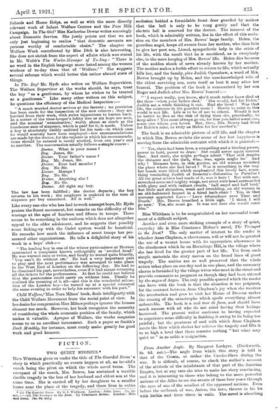FICTION.
TWO QUIET 'STORIES.*
Miss WIIITILUI gives us under the title of The Guarded Room' a story in which practically no events happen at all, an invalid's couch being the pivot on which the whole novel turns. The occupant of the couch, Mrs. Bowes, has sustained a terrible double tragedy in the loss of her husband and eldest son at the same time. She is carried off by her daughters to a- smaller house- near the place, of the tragedy, and there lives in entire • (1) The Guarded Room. By (1. I. Whitham. London : John Lane. Its. 6d. net. r----(2) The Trumpet- in, the Butt. 13y Constance Holm°. London : Mills -and,Iloon. [Si. 6d. net.]
seclusion behind a formidable front door guarded by notices that the bell Is only to be rung gently and that the electric bell is reserved for the doctor. The interest of the book, which is admirably written, lies in the effect of this seclu. aion on the members of Mrs. Bowes' large family. Helen, the guardian angel, keeps all events from her mother, who thus fails
to give her poet son, Lionel, sympathetic help in the crisis of his life, with the result that lie is sacrificed, as is everybody else, to the mere keeping of Mrs. Bowes' life. Helen dies because of the sudden shook of news already known by her mother.
The mother makes a feeble effort to return to life, which actually kills her, and the family, plus Judith Openshaw, a ward of Mrs.
Bowes brought up by Helen, and the unacknowledged wife of the eldest surviving son, sorts itself as best it may after her funeral. The problem of the book is summarized by her son Roger and Judith after Mrs. Bowes' funeral :-
" I expect really, you know, she'd much rather have died at the time—when your father died.' She would, but for Helen.' Judith sat a while thinking it out. Had she lived ? Was that life, the existence in the guarded room ? Merely to exist in this world is not life. Life is to be of use to others. Would it not be better to live at the risk of dying than die, praotically, to keep alive You must always go on, for fear you failed some one, some one whom you loved. But, then, Mrs. Bowes had lived for Helen's sake, as truly as Helen for her mother's."
The book is an admirable picture of still life, and the chapter in which Mrs. Bowes revisits the scene of her lost happiness is moving from the admirable restraint with which it is painted:—
" Yes, there had been love, a compelling-and a binding power, power to hold, power to draw.' She could never again contest that. And more, she might perhaps admit ` That still despite the distance and the dark, wham was, again might be.' And why ? Because here, in this garden, an old woman revisited the place whore she had loved I Was it something in the way her hands were lifted which emphasized this lovely fact, some- thing reminding Judith of Rossetti's ..Salutation in Paradise ? All the great artists had made of it, was it here ? Not with out- stretched arms and mighty wings, not erect with head surrounded with glory and with radiant, clouds, ' half angel and half bird,' but little and shrunken, weak and trembling, an old woman in an old-fashioned bonnet in a hired bath-oltair ? Yes, in- that moment appeared Love—' Love triumphant over Time and Death.' Mrs. Bowes breathed a little sigh. ` I think I will go now.' Yes, she must go. It was not here she would meet him."
Miss Whitham is to be congratulated on her successful treat.
ment- of a difficult subject.
Another and even more striking example of a story of quiet, everyday life is Miss Constance Holme's novel,' The Trumpet in the Dux[.' The only matter of interest to the reader is
whether Anne Clapham, a charwoman, will or will not be granted the use of a vacant house with its appropriate allowances in the almshouses which lie on. Hermitage Hill, in the village where she has lived for the greater part of her life. Yet from such simple materials .the story . moves on the broad lines of great tragedy. The -unities are so well preserved that the whole action takes place an one day and in one place, and the necessary
chorus is furnished by the village wives who meet in the street and provide comments as pregnant as though they had been uttered by. the sages of Argos. The only possible quarrel which the reader can have with the book is that the situation is too poignant, for the contrast between Anne Clapham's joy when she receives tho nomination and goes to visit her House of Dreams makes the coming of the catastrophe which spoils everything almost unbearable. The book. is a real tour de force, and should have much success with all who do not mind having their feelings
harrowed. The present writer confesses to having expected to experience some difficulty in finishing it owing to its being too painful ; but the greatness of soul with which Anne Clapham meets the blow which shakes her relieves the tragedy and lifts it to so high a level that there remains nothing " but what may quiet us " in so noble a. resignation.


































 Previous page
Previous page